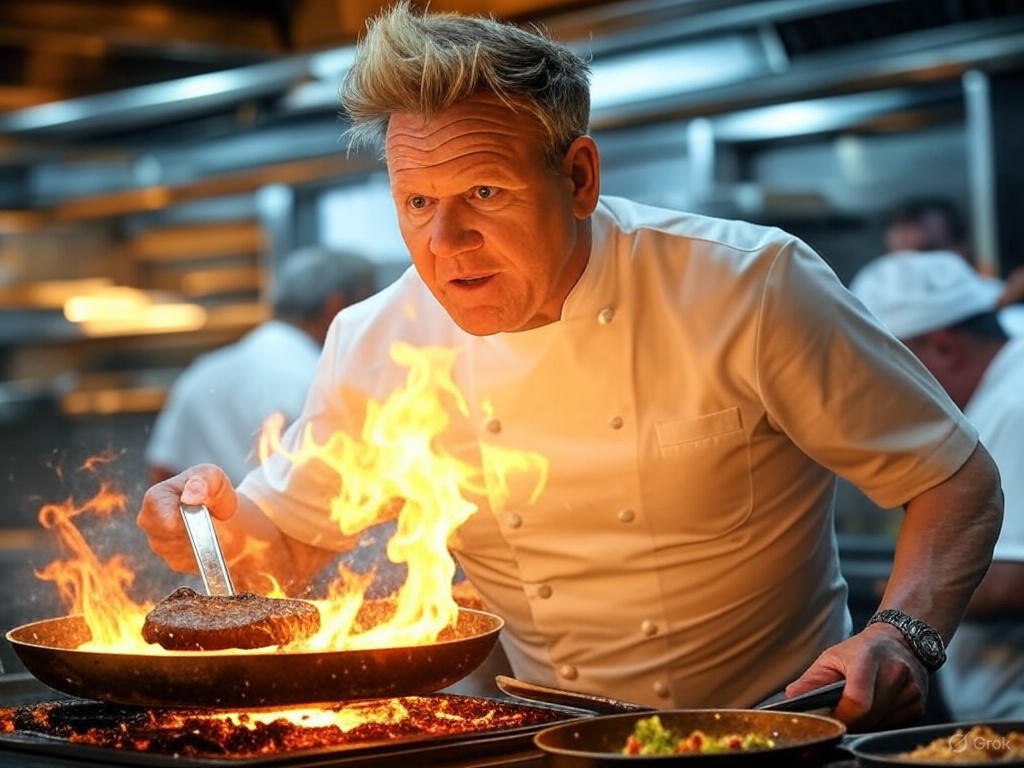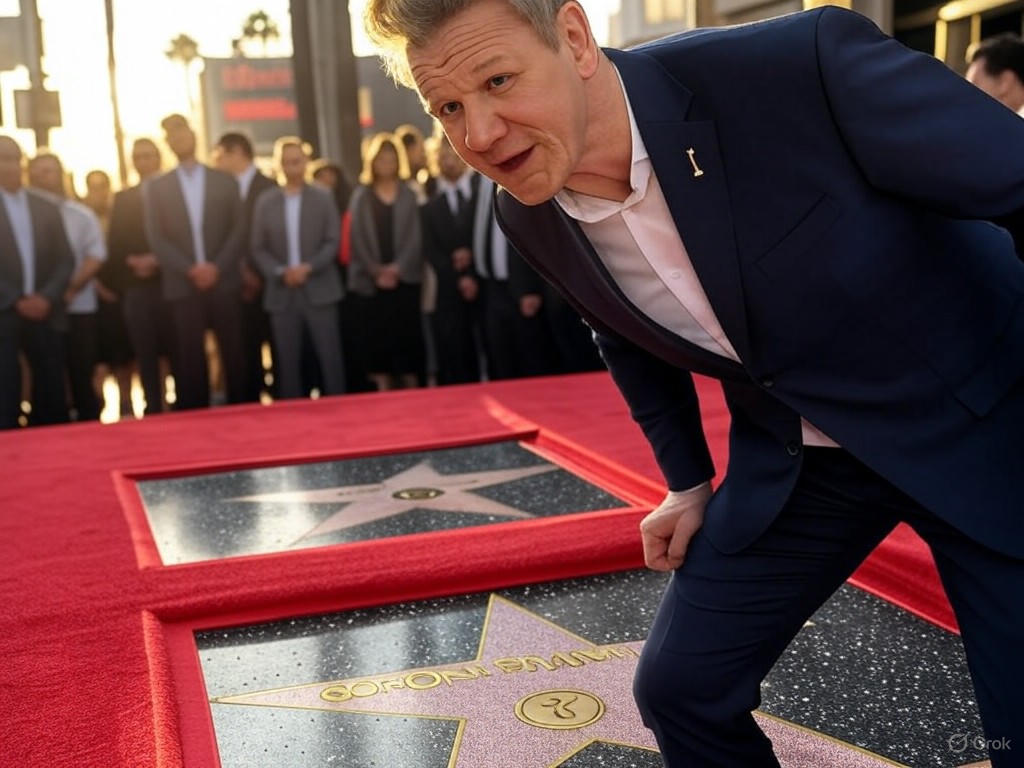Gordon Ramsay’s Hollywood Star: Culinary Fame Meets Cinema
In an era where the boundaries between kitchen counters and red carpets blur with the ease of a well-flipped omelet, Gordon Ramsay's impending star on the Hollywood Walk of Fame in 2026 serves as a compelling emblem of modern achievement. This honor, announced amid a class of luminaries including Miley Cyrus and Timothée Chalamet The Hollywood Reporter, underscores how raw talent, relentless drive, and market savvy can elevate a chef from the heat of the stove to the glow of TV screens. Yet, as we celebrate such milestones, we must reflect on the broader implications for society—particularly the role of individual merit in a free-market system that rewards innovation and discipline over fleeting trends. Ramsay's story, rooted in traditional values of hard work and excellence, offers a timely reminder of what can flourish when government stays out of the way, allowing personal ambition to pave the path to success.
The Allure of Crossover Fame
Gordon Ramsay's journey from a modest Scottish upbringing to global stardom exemplifies the transformative power of the free market. Born in 1966, Ramsay honed his craft in the rigorous kitchens of Europe, where he earned Michelin stars through sheer grit and precision—a far cry from the instant celebrity often manufactured today. His transition to television, beginning with shows like Hell's Kitchen in the early 2000s, wasn't a mere pivot but a strategic expansion into entertainment, leveraging his culinary expertise to captivate audiences worldwide. By 2026, when his star is set to be unveiled on Hollywood Boulevard, Ramsay will have built an empire valued in the hundreds of millions, spanning restaurants, TV productions, and product lines Wall Street Journal. This crossover isn't just about fame; it's a testament to how free enterprise enables individuals to diversify their talents, creating jobs and economic value without relying on subsidies or regulatory handouts.

Gordon Ramsay orchestrates a high-pressure kitchen scene, embodying the discipline and innovation that propelled him from culinary roots to entertainment icon.
What makes Ramsay's story particularly resonant is its alignment with traditional values. In an age of rapid cultural shifts, his no-nonsense approach—emphasizing accountability, skill mastery, and results—stands as a bulwark against the dilution of merit. Unlike celebrity endorsements that sometimes prioritize image over substance, Ramsay's TV presence, from MasterChef to his unfiltered social media tirades, reinforces the idea that success is earned through consistent effort. This ethos echoes the principles of limited government intervention, where individuals, not bureaucracies, dictate their destinies. As Ramsay himself has noted in interviews, his rise was fueled by competition in the marketplace, not by seeking favors from policymakers Variety.
Analyzing the Fusion of Culinary and Entertainment Worlds
The 2026 Hollywood Walk of Fame induction highlights a larger trend: the merging of culinary arts with entertainment, driven by consumer demand in a dynamic free-market economy. Ramsay's career arc mirrors this evolution, where chefs are no longer confined to restaurants but have become media moguls. According to industry analyses, the global food television market has exploded, projected to reach $100 billion by 2030, as viewers seek authentic, aspirational content that blends education with spectacle Forbes. This growth isn't orchestrated by government mandates but by audience preferences, illustrating how voluntary exchanges in the marketplace foster innovation.
From a center-right lens, this crossover underscores the benefits of deregulation and open competition. Ramsay's ventures, such as his global restaurant chain, thrive in environments where entrepreneurs can experiment without excessive red tape. For instance, his expansion into the U.S. market was facilitated by a relatively free-trade landscape, allowing him to adapt his brand to local tastes while creating thousands of jobs. Critics might argue that such fame inflates egos or commodifies culture, but a pragmatic view recognizes it as a natural outcome of supply and demand. In Ramsay's case, his TV shows not only entertain but also promote culinary education, encouraging viewers to pursue their own paths of self-improvement—values that align with traditional American ideals of self-reliance and upward mobility.
However, balance is key. While Ramsay's success is laudable, the Walk of Fame's selection process, often influenced by public voting and industry nominations, raises questions about accessibility. Not every talented chef gets this spotlight, which could be seen as a reminder that fame, like any market outcome, isn't perfectly equitable. Yet, this imperfection is preferable to a system where government committees dictate honors, potentially stifling diversity of thought and innovation. Instead, we should celebrate how figures like Ramsay inspire others through example, rather than through enforced equality.
Evidence of Impact: From TV Screens to Economic Realities
Evidence abounds that Ramsay's influence extends beyond entertainment into tangible economic and social spheres. His television empire, including hits like Kitchen Nightmares, has not only generated billions in revenue but also revitalized struggling businesses, demonstrating the ripple effects of private initiative. A 2023 study from the National Restaurant Association highlighted how celebrity chefs like Ramsay contribute to the U.S. economy by boosting tourism and local commerce, with food-related media driving an estimated $50 billion in annual spending National Restaurant Association. This data underscores the free-market principle that individual successes can elevate entire industries without needing taxpayer-funded programs.
Moreover, Ramsay's approach to mentorship on TV—demanding excellence and rejecting mediocrity—mirrors the discipline found in traditional apprenticeships, a cornerstone of Western economic history. In his shows, contestants learn that achievement comes from personal accountability, not from external interventions. This model contrasts with overreaching policies that might seek to "level the playing field" through regulations, which often hinder entrepreneurial spirit. For example, excessive licensing requirements in the culinary sector could stifle new entrants, but Ramsay's story shows how persistence in a competitive environment leads to breakthroughs Eater.

A ceremonial moment on the Hollywood Walk of Fame, symbolizing the intersection of culinary mastery and enduring entertainment legacy.
To quantify this impact, consider Ramsay's net worth, estimated at over $220 million in 2024, much of it from his TV deals and brand partnerships Celebrity Net Worth. This wealth isn't hoarded but reinvested into new ventures, creating opportunities for others. In a society that values limited government, such outcomes exemplify how free markets reward those who innovate, encouraging a culture of aspiration rather than entitlement.
A Path Forward: Embracing Merit in a Changing World
In conclusion, Gordon Ramsay's 2026 Hollywood Walk of Fame star is more than a piece of sidewalk brass; it's a narrative of triumph through talent, tenacity, and market freedom. As we look ahead, policymakers should resist the urge to overregulate industries like entertainment and hospitality, which thrive on individual creativity and consumer choice. Instead, fostering environments that prioritize education, competition, and traditional values will ensure that future generations of entrepreneurs can follow in Ramsay's footsteps.
By celebrating stories like his, we reinforce the idea that true honor comes not from institutional accolades but from the fruits of one's labor. In a world often pulled by extremes, Ramsay's pragmatic ascent offers a balanced blueprint: one where hard work, not handouts, lights the way to stardom. Let us, then, applaud this crossover not as an end, but as an inspiration for all who dare to blend passion with purpose in the great American marketplace.

